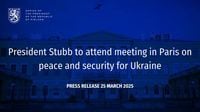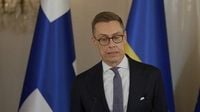The President of the Republic of Finland, Alexander Stubb, is set to attend a significant meeting of heads of state and government in Paris on Thursday, March 27, 2025. This gathering, hosted by French President Emmanuel Macron, is poised to tackle crucial issues surrounding the ongoing support and stability for Ukraine amidst the ongoing conflict.
This meeting is particularly vital as it will address key topics such as continuing and strengthening support for Ukraine, negotiating a ceasefire, and establishing a framework for lasting peace, as well as discussing related security arrangements. The discussions come at a pivotal moment as Ukraine seeks broader international backing to navigate the complexities of its war and its aftermath.
In a related development, Ukrainian President Volodymyr Zelenskyy is scheduled to visit France the day prior, on March 26, 2025. Zelenskyy is expected to meet with Macron in the evening to discuss pressing bilateral issues and preparations ahead of the larger meeting. This visit underscores the collaborative efforts between Ukraine and its allies while reinforcing the urgency behind diplomatic engagements aimed at resolving the current crisis.
As leaders come together in Paris, the atmosphere will be charged with expectations—not just for the future of Ukraine, but also for the broader implications of international cooperation in safeguarding security and peace within Europe. Stubb's participation adds a layer of commitment from Finland to contribute to the collective discourse on security measures and strategies necessary for sustaining support for Ukraine.
Finland, which borders Russia, has been particularly attentive to developments in Ukraine, reflecting heightened security concerns within the region. Stubb's involvement signifies Finland's readiness to engage actively in European security matters, promoting stability through a robust diplomatic approach.
The agenda set for this high-level meeting will focus on various aspects, including military support for Ukraine and humanitarian assistance, as well as discussing potential pathways toward rebuilding the nation once hostilities cease. Leaders are anticipated to deliberate on not only immediate responses but also long-term strategies to foster resilience in Ukraine.
The proactive stance being adopted by Finland and the collaborative approaches encouraged by Macron stress the importance of unity amid disagreements among some European nations regarding military aid to Ukraine. Thus, Stubb's presence at this gathering embodies the critical alignment among various states committed to sustaining Ukraine's sovereignty and territorial integrity.
As the world watches these diplomatic efforts unfold, the hope remains that such gatherings will lead to tangible outcomes— paving the way for peace negotiations that prioritize the humanitarian needs of affected populations, while also ensuring a secure, peaceful future for Ukraine.
By bringing together influential leaders at this crucial time, the upcoming Paris meeting stands as a testament to the international community's backing of Ukraine and its ongoing struggle against aggressive territorial advances. The resolutions forged during this dialogue will undoubtedly carry significant weight in shaping the future of both Ukraine and European security architecture.
Particularly in the context of heightened geopolitical tensions, the discussions in Paris may also mirror the strategic priorities of other nations watching closely from the sidelines, showcasing a united front against aggression while providing reassurances to those directly involved in the tragic consequences of conflict.
As we await further developments, the summit's agenda will be watched closely, and the ability of world leaders to make progress on these critical issues will be crucial. The outcome could significantly impact the landscape of relations in Europe and set a precedent for international diplomacy in addressing crises.
With many stakeholders invested in Ukraine's future, the Paris meeting offers a hopeful glimpse into the potential for alliances to emerge fiercely committed to restoring peace and collaborating on security strategies needed for such a complex situation. As Stubb represents Finland's commitment alongside his European counterparts, the call for global solidarity remains clearer than ever.
Indeed, it poses an important question for all involved: can shared resolve lead to actionable change, and might this be the turning point towards ending hostilities and rebuilding hope in Ukraine's future?





